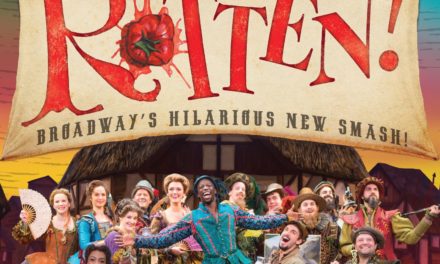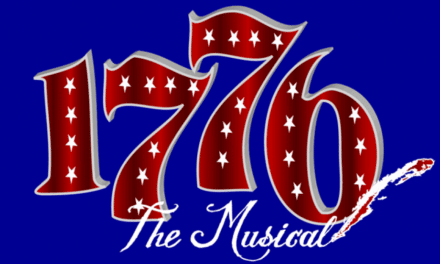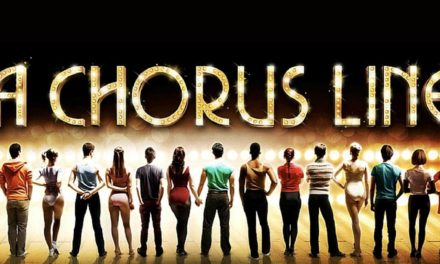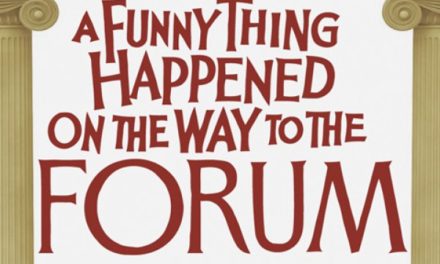By guest contributor James Miller
Through the first half of Act One in the Tony Award winning musical Jersey Boys, we’re introduced to the young men in the late ’50s who ultimately became The Four Seasons. We see how young Frankie Valli came into the group, and, later, how the talented song writer Bob Gaudio came aboard. We find out that both Tommy DeVito and Nick Massi spent some time in prison, and we see how they came upon the name, “The Four Seasons.” It’s all fairly episodic, almost seeming like a mix of narration and revue; yes, it’s entertaining, with some pleasing ’50s music as part of the mix, but we’re still waiting for that jolt which we’ve come to expect from a Tony winner. After a wonderfully written build up, the group sings the song that would become their first huge hit — “Sherry.” That gives more than a jolt to Jersey Boys. It brings some real theatricality, and from that point on, it’s all clear sailing, and Jersey Boys soars, living up to its award winning and popular status. “Sherry” is immediately followed by three more monster hits; and, in the second act, the show adds some genuine drama and legitimate emotion.
I had seen Jersey Boys twice early in its run and had the chance to revisit it again recently, and it’s in great shape. The musical is a true crowd pleaser that has also been skillfully constructed. While it is carried by the infectious music and the talented young men playing The Four Seasons, enormous credit also must go to book writers Marshall Brickman and Rick Elice, along with Director Des McAnuff. The book writers help us care about the characters and their story. McAnuff keeps things moving, providing some wonderful visual perspectives and a sense of style, among his many other touches. And, together, they have wisely chosen not to inappropriately squeeze the Four Seasons songs into the show as book numbers. Most of the songs are done as performance numbers, either in a studio, a club, or on television. Some of them do comment on the proceedings, and there are three songs that serve effectively as book numbers. Thanks to the work of the book writers and McAnuff, the show truly does what the best musicals should do: it transports its audience. That is particularly evident in several second act moments, especially near the end of the show, when The Four Seasons reunite for the first time in years to perform at their induction into the Rock and Roll Hall of Fame. The audience applauds the moment, not because of anything theatrically special happening on stage, but because the creators have so successfully told the story that the audience finds itself, at that instant, applauding as if we are witnessing the actual Four Seasons reunion at their Hall of Fame induction. It’s one of several examples of the high level of theatricality that Jersey Boys brings to its audience.
That said, Jersey Boys isn’t quite as powerful or as thrilling as Dreamgirls, a show I was reminded of while watching Jersey Boys; Dreamgirls is another musical that, while fictional, tells the story of the rise of a singing group. But, since Dreamgirls may be my all time favorite musical, saying that Jersey Boys doesn’t quite measure up to Dreamgirls is by no means a criticism.
Jersey Boys also benefits from four strong performances by the actors portraying the Four Seasons. It starts with Tony winner John Lloyd Young, who is magnificent as Frankie Valli. He sings beautifully, acts with authority, and gives Valli’s character a nice arc, from naïve innocence in the beginning to success, along with some heartache, as the story goes on. When I went back recently, Young was out, but his replacement, Michael Longoria, did a fine job, and the show did not suffer at all. Longoria really came on strongly in the second act; he doesn’t quite have Young’s presence, but his Frankie is a bit scrappier, and he does excellent work — you won’t be disappointed if you see him. Another Tony winner is Christian Hoff, who is perfect as Tommy DeVito, the bad boy of the group. I loved the work of Daniel Reichard, who sings well and is an impressive, likable Bob Gaudio. At the most recent visit, I gained more appreciation for the nuances and the fine acting done by J. Robert Spencer as the fourth member of the group, Nick Massi.
Sergio Trujillo has added some effective choreography. While “Sherry” and the three numbers that follow highlight the first act, the drama inherent in the story of the group really builds in Act Two. You may be surprised, as I was the first time, at how strong the story is, and how emotionally powerful it proves to be. It culminates in monologues near the end of the show for each of the four leads, which are moving and dramatically satisfying. There are some musical highlights too, of course, especially “Can’t Take My Eyes Off You,” which is a knockout, whether performed by Young or Longoria as Valli. Again, the creators do some marvelous work leading us into the number, making the song itself all that much more exciting and satisfying. The show’s closing number, which follows Valli’s final monologue, ends the evening on a rousing note.
There have been some pretty poor so-called jukebox musicals on Broadway in recent years. But, don’t confuse Jersey Boys with them. Yes, it does use The Four Seasons catalogue. But, it tells a good, solid story with style, drama, and emotion, using the music generally as it should be used – as performance songs being performed by The Four Seasons. For those who fondly remember those songs, the musical probably is a nostalgic reminder of days gone by; but, even if you’re not a Four Seasons fan, Jersey Boys still is a genuine crowd pleaser and an enormously entertaining evening of well done musical theater.
[amazon_link asins=’B07FK67Y4P,B00A82TRK4,B00L8O3KMW,B005PQ4N48′ template=’ProductGrid’ store=’MusicalWriters.com’ marketplace=’US’ link_id=’3f2eb179-1456-477d-8f19-f5fd2d530b41′]


















